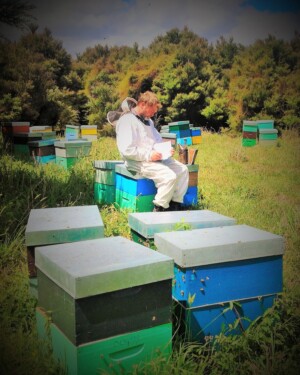EDITORIAL
Karin Kos, Apiculture New Zealand Chief Executive
Welcome to the Autumn edition of The New Zealand BeeKeeper journal. As the 2024/25 season comes to an end, beekeepers will be looking forward to getting hives wintered down and to having a well-earned break.
The season by all accounts has been mixed (depending on what part of the country you come from). Certainly, the second half of the season with an unexpected cold snap put a dampener on honey flows for many. For a snapshot of how the season fared for those around the country, see From the Colonies on page 48.
On a more positive note, the overall loss rate over winter 2024 is lower than the loss rates recorded over winter for the previous four years, sitting at 10.8 per cent. While varroa remains the main cause of losses, this is first time varroa declined since they were measured by the colony loss survey. You can read more about the survey on page 6. I also want to acknowledge the work of survey director Pike Stahlmann-Brown in running the survey, year after year, and the Ministry for Primary Industries for funding this important work.
The future of Apiculture New Zealand
In other news, Apiculture New Zealand held a Special General Meeting (SGM) with members in late March to discuss the future of the organisation. For those not so familiar with the background, it is helpful to provide some context to that meeting.
For some time now we have indicated that the current voluntary industry good organisation is not financially sustainable in the current environment. Low honey prices and a honey oversupply following a pandemic has seen membership numbers fall, along with membership income.
In recognising this challenging environment, we launched the New Zealand Honey Strategy early last year. One of the first priorities was the need for strengthened industry leadership, and a peak body organisation that could operate with sustainable, assured funding. That led to ApiNZ working with the UMF™ Honey Association to propose a model of industry leadership, along with a proposed levy on honey exports as a means to sustain industry good activity.
The proposed New Zealand Honey Association (NZHA) was intended to deliver this and focused on the needs of the commercial beekeepers and honey exporters. Its members were to be represented by a Board, which aimed to have a balance of commercial beekeeping and honey exporting experience in the elected member directors.
A draft constitution was developed, in consultation with our respective members and wider industry, followed by an initial vote calling on the UMF™ Honey Association members to approve the constitution. This vote was not successful and that meant that the New Zealand Honey Association would not proceed.
This left a vacuum for ApiNZ members to join the new organisation. In light of this, and given ApiNZ’s financial situation, the Board outlined resolutions to wind down the organisation and run residual operations for a few months to allow time for a key Ministerial decision to be made on the governance of the American Foulbrood Pest Management Agency (AFB PMA). ApiNZ has overall management responsibility for the AFB PMA.
At the March meeting, ApiNZ members voted for time to consider a potential alternative structure and funding model. It has been clear from messages we have received from members, and from the sentiment in the meeting, that ApiNZ’s professional approach to advocacy, communications and its strong connections with stakeholders are valued.
The Board is committed to upholding the members’ will to continue for a fixed time, around three to four months, to be followed by a meeting outlining its findings and recommendations.
As explained at the meeting, this will require funding from members for that time as ApiNZ’s current financial situation means it cannot continue without those funds. We have appreciated the financial commitment that has already been provided by members since the meeting.
We would like to thank members for their overwhelming support to give time to see ApiNZ continue while members consider how the organisation could be re-shaped to meet membership and industry needs for the longer term.
In the meantime, ApiNZ will continue to provide the services and advocacy to ensure our sector continues to be well represented. We aim to ensure our members’ voices are heard from trade and market access matters to submissions to government on matters that affect beekeepers’ ability to keep bees and run businesses. We will continue to provide communication channels, like The New Zealand BeeKeeper journal that keep you, our readers and members, well informed.

Photo: Jody Mitchell.

